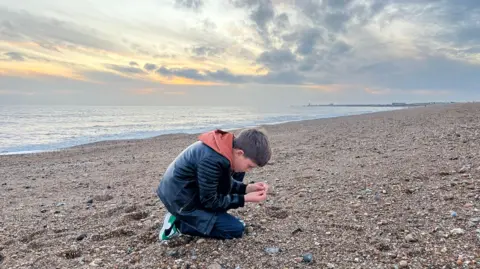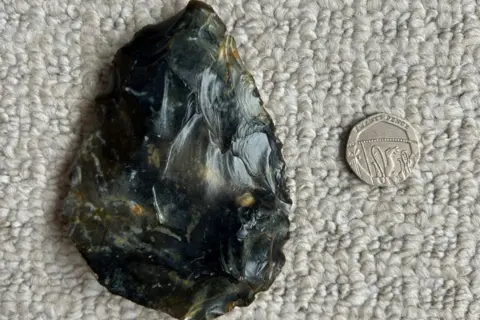Boy finds rare Neanderthal axe on Sussex beach
 George Carden / BBC
George Carden / BBCA boy who found a shiny rock while playing at a beach has been told the item is a Neanderthal hand axe that could be 60,000 years old.
Ben, from Shoreham, West Sussex, discovered the axe at Shoreham Beach when he was only six years old, and kept it in his room for three years.
It was only when the boy, now aged nine, went to Worthing Museum three weeks ago and saw the Stone Age exhibition that he realised he had a similar looking item at home.
The museum, which is now exhibiting the axe, said it was "almost certainly made by a Neanderthal" between 40,000 to 60,000 years ago.
Ben said: “I was looking around and I saw this shiny flint rock. I just thought it looked different to all the other different pebbles and stones."
He said he kept it in his room but was always "losing it and finding it".
 Emma Witten
Emma WittenBen added that the museum said "it looked like an amazing find.
"They said it’s their best find in ten years. Now it’s in a case in the museum. I was really excited, my heart was beating really fast," he said.
“I did want to keep it, but I felt like it would be better there than in my hands.”
His mother Emma told BBC Radio Sussex: “Seeing how it lit up the face of the archaeologist at the museum, it’s great that others can enjoy it.”
A spokesperson from Worthing Museum said the hand axe dates back to the Late Middle Palaeolithic era which was between 40,000 to 60,000 years ago.
They said: "Ben found the flint axe in the upper shingle at Shoreham beach, so it is very difficult to say with confidence whether the axe was originally lost there or whether it was dredged up from offshore river deposits during work to strengthen the beach defences."
The Neanderthals are considered to be the long-lost evolutionary cousins of modern humans, who became extinct about 40,000 years ago.
Follow BBC Sussex on Facebook, on X, and on Instagram. Send your story ideas to [email protected] or WhatsApp us on 08081 002250.
